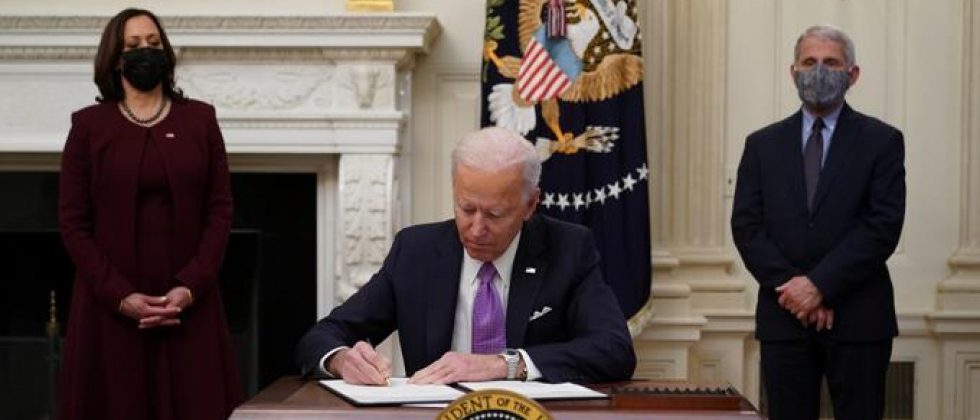news
“Biden’s agenda”, an article by Dr. Leonel Fernández
April 13, 2021
With the end of the Cold War in 1991, an event that contributed to the fall of the Berlin Wall, the collapse of the Soviet Union, and the downfall of the Eastern European popular democracies, the United States emerged as the only world power.
Back then, the conversation centered on the end of history, the triumph of capitalism and democracy, and the unipolar scenario headed by the United States in the international stage.
But looking back, what occurred in the United States – and the rest of the world for that matter – to motivate President Joe Biden to state in his inaugural address that American democracy, although fragile, had prevailed?
There is no doubt that in his statement the newly elected American President was acknowledging the existence of a crisis that no one ever thought possible: the legitimacy of the American democratic political system.
That issue, of course, was directly related to the assault on the U.S. Congress on January 6 by a violent mob which, incited by President Donald Trump, wanted to alter the results of the presidential elections (which the protesters believed to be false) through violent measures. This attack, considered unimaginable was, however, the latest in a series of events which began in the post-Cold War period. These actions brought into evidence the economic, social and political decline of the United States.
The strategic objective of President Joe Biden’s government agenda is to correct or amend this situation. In his inaugural address, he highlighted the existence of six critical events that are currently impacting the American way of life. The first, of course, is the Covid-19 pandemic, poorly handled by President Biden’s predecessor. The pandemic has impacted more than 20 million individuals and provoked more than 400 thousand deaths worldwide. This last number surpasses the number of American deaths registered during World War II.
Furthermore, there is the economic impact generated by the pandemic, such as an economic downfall, high unemployment and the failure of many businesses.
Likewise, there is an additional crisis generated by social inequality, racism, climate change, as well as the trust and credibility in the system. Also, the role played by the United States in the world.
All these events highlight the colossal task President Biden has to face in order to once again place his country in a position of global leadership. The task at hand is to face issues that are impacting the United States as well as the international community.
GLOBALIZATION MISADJUSTMENTS
In order to implement his Administration’s agenda, the newly sworn-in President began by dismantling the legacy of Donald Trump, responsible for the current critical crisis faced by the United States.
But turning back the foolish policies introduced by his predecessor will not be enough to reactivate the U.S. economic, social and political systems. And it also will not be enough to return to the policies that characterized the Obama Administration.
The situation is quite complex. And this is due to the fact that after the end of the Cold War what began to dominate the world scenario was the globalization phenomenon in the economic, commercial and financial sectors.
In the beginning it was the leftist movements, at the international level, that led the struggle against the new globalization wave. They demanded a process that represented a globalization process with a human face.
But, over time and in a paradoxical way, it was the political movements and right-of-center and extreme right parties that ended up assuming the anti-globalization conversation.
The reason was that the global value chains provoked the move of U.S. companies to other locations. The main reasons for these moves were the reduction in labor costs and, consequently, increasing profits for these companies.
Thus, without having set these results as a goal, globalization gave rise to a de-industrialization phenomenon provoking skyrocketing unemployment and, therefore, economic and social instability for significant numbers of white, middle class and blue-collar American workers.
In addition, there was the trade deficit, the global financial crisis of 2008, a decade-long global recession, and the belief that the massive migration of Hispanics was harming their lifestyle because they provided cheap labor that displaced American workers from the labor market.
It was, among others, those socio-demographic, economic and cultural factors that engendered discontent and served as the foundation for the creation of a social base that supported the election of Donald Trump in the 2016 elections, where he obtained more than 70 million votes in the 2020 electoral process.
CHANGE OF COURSE
Immediately after his inauguration, President Joe Biden signed 17 executive orders, memoranda and proclamations to nullify the policies introduced by Trump, both domestically and internationally.
He kept the promise made in his inaugural speech that at this time “there is much to repair; much to restore; much to heal; much to build and much to gain…” in the United States.
He ordered the suspension of the construction of the wall on the U.S.-Mexico border, and left behind the isolationist and unilateralist policies introduced during the previous four years.
He reinstated the United States in the Paris Agreement on climate change, as well as in the World Health Organization. The goal was to restore authority and prestige to the institution in its role as global coordinator of health policies.
Biden also established that during his tenure in office the United States will once again play an active role in multilateral organizations. This step will represent tremendous progress in the handling and in solving major global problems and conflicts.
But President Biden will undoubtedly face serious difficulties in the foreign policy sector. In this area, for example, he will have to regain the trust of the traditional European North American allies.
During the past Republican Administration, the U.S. government humiliated its traditional transatlantic allies. Their considerations on the role of the NATO military alliance led France and Germany to consider the need to design strategic autonomous strategies with regard to security.
And the same is true when it comes to Iran. How can that Muslim country believe in the United States, if what is negotiated and agreed with one government is unilaterally not recognized by the following authorities?
And, in regards to China – and in spite of the commercial, geopolitical or technological differences that exist – this relationship should not be treated with a tone and rhetoric that does not measure up to its status as the second economic power in the world.
How will negotiations go forward with Russia in order to sign a new treaty to reduce nuclear weapons?
What will be his policy regarding Latin America and the Caribbean, aside from Cuba and Venezuela?
To conclude, President Joe Biden’s agenda, both at the national and international levels, to overcome the multi-dimensional crisis of the United States, will be hard, complex and difficult.
However, for the good of his country and the world, his efforts will be much more superior to what was left behind by his predecessor in the White House.






